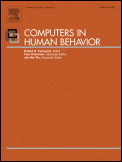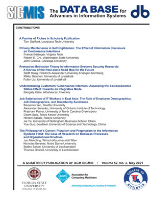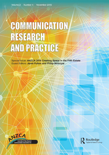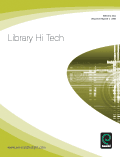
COMPUTERS IN HUMAN BEHAVIOR
Scope & Guideline
Pioneering Research at the Forefront of Technology and Behavior
Introduction
Aims and Scopes
- Human-Computer Interaction (HCI):
Research focused on understanding how individuals interact with computers and the design of user-friendly systems that enhance user experience. - Digital Media and Communication:
Explores the impact of digital communication platforms on social behavior, identity formation, and interpersonal relationships. - Mental Health and Technology:
Investigates the effects of technology use on mental health, including issues such as addiction, anxiety, and the role of social media in shaping psychological well-being. - Educational Technology:
Examines the role of technology in educational settings, including the effectiveness of digital tools and platforms in facilitating learning and engagement. - Cyberpsychology:
Studies the psychological aspects of online behaviors, including cyberbullying, online gaming, and the influence of digital environments on human behavior. - Ethics and Privacy in Technology:
Addresses the ethical implications of technology use, focusing on privacy, data security, and the social responsibilities of tech developers.
Trending and Emerging
- Artificial Intelligence and Machine Learning:
Studies focusing on the implications of AI and machine learning in various domains, including education, healthcare, and consumer behavior, are gaining momentum. - Virtual Reality and Augmented Reality:
Research on the psychological and behavioral effects of immersive technologies is increasing, particularly in relation to education and therapeutic applications. - Social Media Dynamics:
Exploration of the complexities of social media interactions, including the effects of algorithms, misinformation, and community dynamics, is becoming a key area of focus. - Mental Health Interventions:
Emerging research on the use of digital platforms for mental health support, including teletherapy and mobile health applications, highlights the intersection of technology and psychological well-being. - Gamification and Engagement:
The application of gamification in various contexts to enhance user engagement and motivation is a rising trend, particularly in educational and health-related technologies. - Ethical Considerations in Technology:
An increasing emphasis on the ethical implications of technology use, particularly in relation to privacy, surveillance, and the social responsibilities of tech companies, is becoming prominent.
Declining or Waning
- Traditional Media Effects:
Research specifically focused on traditional media (television, radio) effects on behavior is less prevalent, with a shift towards digital platforms. - Basic User Experience Studies:
Studies that merely assess user satisfaction without deeper psychological insights are declining in favor of more complex analyses involving emotional and cognitive factors. - General Cyberbullying Research:
While still important, the volume of general studies on cyberbullying is decreasing as research becomes more focused on specific contexts and populations. - Single-Technology Impact Studies:
Research that examines the impact of a single technology in isolation is waning, with a trend towards more integrative studies that consider multiple technologies and their interactions.
Similar Journals

INTERNATIONAL JOURNAL OF INFORMATION MANAGEMENT
Elevating research standards in artificial intelligence and communications.International Journal of Information Management, published by Elsevier Science Ltd, is a premier journal dedicated to advancing the field of information management and its associated disciplines. With an impressive impact factor and categorized in the Q1 quartile across multiple domains such as Artificial Intelligence, Computer Networks and Communications, Information Systems, and Library and Information Sciences, this journal stands at the forefront of research excellence. Established in 1970 and running through to 2025, it serves as a vital platform for disseminating influential research and innovative ideas within these rapidly evolving fields. The journal's rigorous peer-review process ensures that only the highest quality research is published, thereby fostering academic discourse and collaboration among researchers, professionals, and students globally. Although it does not currently offer open access, the journal provides essential access options through institutional subscriptions, making groundbreaking research accessible to a broad audience. By continually adapting to the dynamic landscape of information management, the International Journal of Information Management reinforces its significance as a leading source of knowledge and insight for those dedicated to the advancement of science and practice in this vital sector.

Information Technology & People
Connecting innovative research with real-world implications.Information Technology & People is a renowned academic journal published by Emerald Group Publishing Ltd, dedicated to advancing insights in the intersection of technology, organizational context, and human behavior. Established in 1990, the journal has extensively contributed to the field of Computer Science Applications, Information Systems, and Library and Information Sciences, reflecting top-tier research as evidenced by its Q1 quartile ranking in 2023 across these categories. With a notable Scopus ranking, including a percentile of 91st in Library and Information Sciences, it serves as an essential resource for researchers, professionals, and students eager to explore contemporary issues and innovations in the deployment and impact of information technology on society. While not operating under an open access model, the journal provides a gateway to pivotal studies and findings that shape the future of IT and its implications for people and organizations. Located in the United Kingdom, Information Technology & People continues to be a vital platform for disseminating cutting-edge research that bridges the gap between technology and human experience.

Cyberpsychology-Journal of Psychosocial Research on Cyberspace
Navigating the Complexities of Online InteractionsCyberpsychology - Journal of Psychosocial Research on Cyberspace, published by Masaryk University, Faculty of Social Studies, is a pioneering open-access journal dedicated to the rapidly evolving field of cyberpsychology, exploring the intricate relationship between technology and human behavior. Since its inception in 2007, this journal has provided a vital platform for researchers and practitioners to disseminate findings on how cyberspace influences social interactions, mental health, and identity formation. With an impressive Q1 ranking in Communication and a strong presence in related fields, including Psychology and Social Sciences, the journal garners significant attention, reflected in its high rankings in Scopus. The open-access model ensures that groundbreaking research is freely accessible, promoting widespread engagement within the academic community. Located in the heart of the Czech Republic, it aims to foster interdisciplinary discussions and encourage critical research that addresses the psychosocial challenges in our increasingly digital world. Researchers, students, and professionals alike are invited to contribute to and benefit from the diverse and dynamic discourse facilitated by this esteemed journal.

DATA BASE FOR ADVANCES IN INFORMATION SYSTEMS
Pioneering Trends in Information Systems ResearchDATA BASE FOR ADVANCES IN INFORMATION SYSTEMS, published by the Association for Computing Machinery, is a pivotal journal in the field of information systems, offering a platform for researchers and professionals to disseminate innovative findings and emerging trends. With its ISSN 0095-0033, this journal encompasses a broad spectrum of topics including data management, information retrieval, and systems architecture, making it a vital resource for scholars and practitioners keen on advancing knowledge in these areas. Although not an Open Access journal, it remains accessible through various academic institutions and libraries, maintaining its reputation as a cornerstone of scholarly communication. By fostering academic discourse, DATA BASE FOR ADVANCES IN INFORMATION SYSTEMS is committed to enhancing the quality and impact of research in the information systems domain, aiming to inspire the next generation of professionals and researchers.

Communication Research and Practice
Empowering Researchers in Communication ExcellenceCommunication Research and Practice is a premier academic journal published by Taylor & Francis Ltd, dedicated to the interdisciplinary exploration of communication studies. Since its inception in 2016, the journal has significantly contributed to the field by addressing contemporary issues in Communication, Human-Computer Interaction, and Political Science, among others. With its impressive category rankings, including Q2 in Communication and Q3 across several related fields in the 2023 category quartiles, it has carved a niche as an authoritative voice in social sciences. The journal's robust indexing and rankings, such as being placed in the 72nd percentile for Political Science and International Relations by Scopus, underpin its reputation as a valuable resource for researchers, practitioners, and students alike. While currently not an open-access journal, it offers substantial insights into the evolving landscape of communication strategies and practices, making it essential for those seeking to enhance their understanding and application of effective communication in various contexts.

Australasian Journal of Information Systems
Catalyzing Collaboration in Information Systems.The Australasian Journal of Information Systems (AJIS), published by the University of Canberra’s Faculty of Information Sciences & Engineering, is a leading open-access journal that has been fostering scholarly communication in the realms of information systems and technology since its inception in 1993. With an ISSN of 1449-8618 and E-ISSN 1326-2238, the journal is headquartered in Australia and provides a platform for innovative research and thought leadership in key areas such as business management, human-computer interaction, and information systems management. Recognized for its quality and impact, AJIS boasts a commendable Q2 ranking in several categories including Information Systems, reflecting its relevance and significance in the academic community. Researchers, professionals, and students alike will find this journal not only instrumental for advancing their knowledge but also essential for engaging with contemporary issues and trends in information sciences. With a commitment to open access, AJIS ensures that high-quality research is widely accessible, fostering collaboration and discourse across international boundaries.

JOURNAL OF COMPUTER INFORMATION SYSTEMS
Exploring the Future of Computer Science and EducationThe JOURNAL OF COMPUTER INFORMATION SYSTEMS, published by Taylor & Francis Inc, is a prestigious academic journal dedicated to the fields of computer science and information systems. With an ISSN of 0887-4417 and an E-ISSN of 2380-2057, this journal has been a valuable resource since its inception in 1995, contributing to the convergence of research until 2024. The journal holds significant status in its respective categories, achieving a Q2 ranking in Computer Networks and Communications, and a Q1 ranking in Education, demonstrating its impact and relevance to a broad academic audience. With Scopus rankings placing it in the 90th percentile for Social Sciences - Education and respectable standings in Computer Science, it serves as a critical forum for the dissemination of innovative research, methodologies, and case studies within the domains of computer information systems. Although not an open-access journal, it remains a highly cited source, attracting researchers, educators, and professionals seeking to enhance their knowledge and contribute to the evolving discourse in technology and education.

INTERNATIONAL JOURNAL OF HUMAN-COMPUTER INTERACTION
Pioneering Insights in Human-Computer DynamicsINTERNATIONAL JOURNAL OF HUMAN-COMPUTER INTERACTION, published by Taylor & Francis Inc, stands at the forefront of research within the interdisciplinary fields of human-computer interaction, human factors, and ergonomics. Since its establishment, the journal has consistently contributed to advancing the understanding of the interactions between people and computers, making it a vital resource for researchers, professionals, and students alike. With an impressive impact factor reflecting its high citation rate, this journal is recognized as a Q1 publication in both Computer Science Applications and Human Factors and Ergonomics categories for 2023, showcasing its stature within the academic community. Additionally, it boasts a commendable ranking within the top percentiles in key areas on Scopus, ensuring that the research published here reaches broad scholarly audiences. Available in traditional subscription format, the journal covers seminal studies from 1989 to 2024, reflecting ongoing innovation in technology and its applications in everyday life, and thus serves as an essential platform for pioneering research that shapes the future of user experience.

BEHAVIOUR & INFORMATION TECHNOLOGY
Innovating Insights into Technology's Impact on Society.BEHAVIOUR & INFORMATION TECHNOLOGY, published by Taylor & Francis Ltd, is a leading journal in the interdisciplinary field that bridges the gap between technology and human behavior. Established in 1982 and continuing through 2024, this journal has garnered a high reputation with impressive rankings in 2023 across various categories: Q1 in Arts and Humanities (miscellaneous), Q2 in Developmental and Educational Psychology, Q2 in Human-Computer Interaction, and Q1 in Social Sciences (miscellaneous). The journal's robust Scopus rankings point to its influence among peers, being placed in the top percentiles across multiple relevant disciplines. Although it does not offer open access, it remains a pivotal resource for researchers and practitioners interested in the dynamics of technology's impact on behavior. By publishing rigorously peer-reviewed research, BEHAVIOUR & INFORMATION TECHNOLOGY aims to foster insights that enhance our understanding of how information technology shapes human interactions and societal outcomes, making it a crucial publication for anyone engaged in this rapidly evolving field.

LIBRARY HI TECH
Pioneering Research for a Digital AgeLIBRARY HI TECH is a distinguished peer-reviewed journal published by Emerald Group Publishing Ltd, offering a vital platform for researchers, professionals, and students in the fields of Library and Information Sciences and Information Systems. Since its inception in 1983, this journal has been instrumental in disseminating cutting-edge research and innovative practices, boasting an impressive Q1 ranking in Library and Information Sciences and a Q2 ranking in Information Systems as of 2023. Recognized globally for its robust scholarship, LIBRARY HI TECH holds significant positions in Scopus, ranking #22 out of 280 in Library and Information Sciences, placing it in the top 92nd percentile, and ranking #77 out of 394 in Computer Science — Information Systems, with an admirable 80th percentile. This journal not only enriches the academic dialogue but also contributes to the practical evolution of library technologies and information management, making it an essential resource for those keen on advancing their knowledge in these dynamic fields. With no open access, access is typically gained through institutional subscriptions or direct purchase, ensuring high-quality dissemination of research findings.